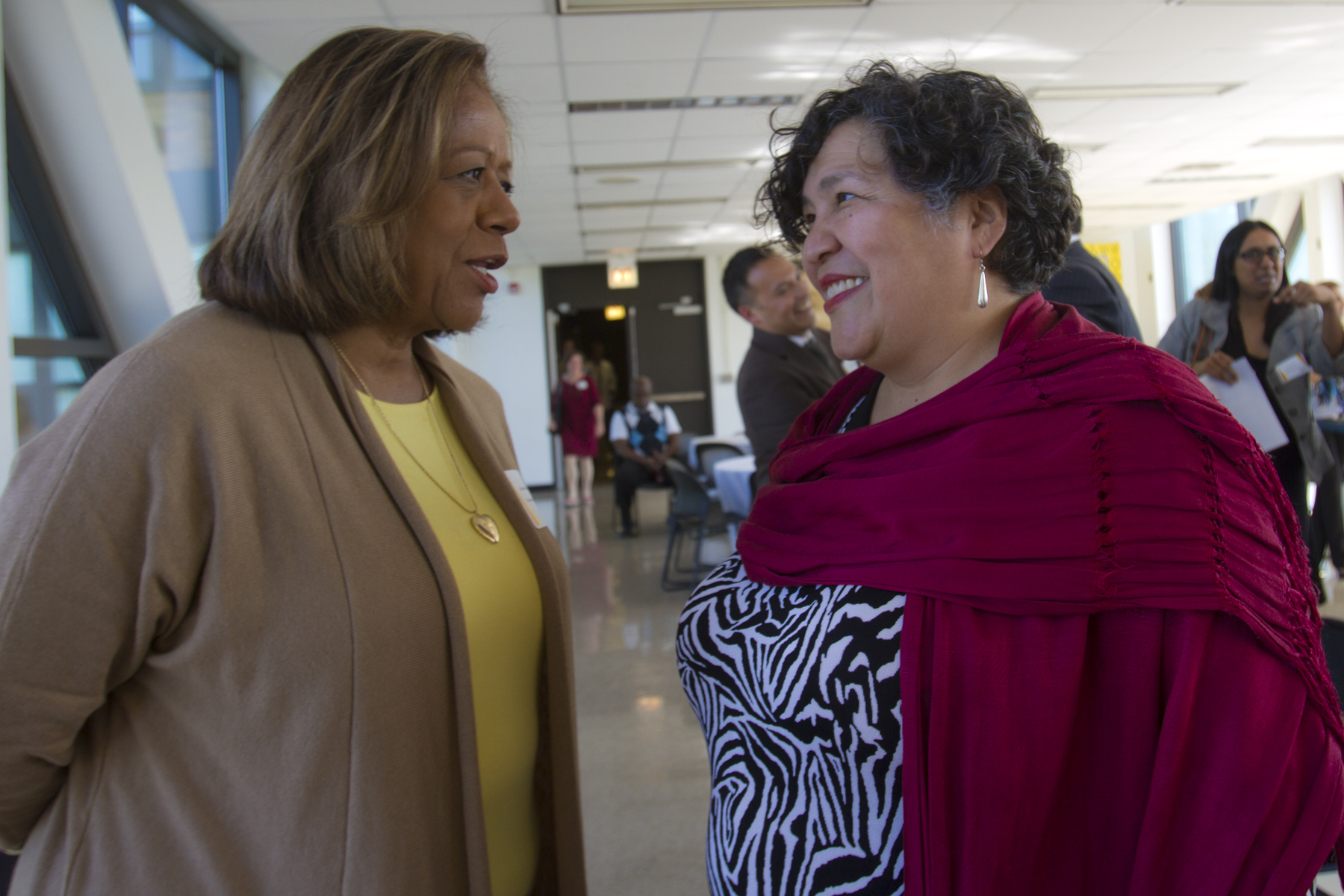"You Have My Word:" CPS CEO Offers Three Steps to Foster Latino Representation, Student Success
 As Dr. Barbara Byrd-Bennett, CEO of Chicago Public Schools (CPS), commented on CPS’ future, she reflected on her past.
As Dr. Barbara Byrd-Bennett, CEO of Chicago Public Schools (CPS), commented on CPS’ future, she reflected on her past.
“I’m from the [housing] projects of Harlem. In the projects, all you have is your word.”
In addressing an audience of nearly 100 Latino community leaders and education advocates at a Latino Policy Forum reception at Roberto Clemente Community Academy on June 19, Byrd-Bennett gave her word that moving forward, her district could and would do better in ensuring strong academic outcomes for Latino students. At the close of a tumultuous school year—one that started with a district-wide teacher strike and ended with the 50 school closings across the city—Latinos remain the largest student cohort in CPS schools, accounting for 44 percent of its student population. But they’re nearly as likely to drop out as they are to graduate: The four-year graduation rate for Latino CPS students was 60 percent, according to 2011 data from Greater West Town Community Development Project.
“When people ask me about the demographics of Chicago Public Schools, I tell them that the district is 42 percent African American, and they nod their heads [knowingly],” said Byrd-Bennett. “But then I tell them that we’re 44 percent Latino, and they’re surprised. Most people don’t realize how big Chicago’s Latino community really is.”
In outlining the details of CPS’s Action Plan, a five-year, five-pillar plan focused on student preparation for college and career, Byrd-Bennett recognized that growing a CPS staff that reflects the diversity of the district’s classrooms is an important first step in fostering Latino academic achievement. Just 22 percent of current CPS staff is Latino—and numbers reveal an even more profound Latino underrepresentation when counting the percentage of teachers (18 percent) and principals (17 percent) across the district. What’s more, Byrd-Bennett’s cabinet has no Latino members, following the departure of Chief of Staff Andrea Saenz in 2012.
“I don’t believe that the only people who can [effectively] teach Latino [students] are Latino [teachers], but I agree that Latinos need greater representation [amongst CPS staff],” said Byrd-Bennett. “[CPS’] instructional programs and goals must reflect who we are. And if we don’t figure out how to integrate [linguistic validation] into our classrooms, 44 percent [of our students] are cut out.”
In a follow-up conversation moderated by Sylvia Puente, executive director of the Latino Policy Forum, Byrd-Bennett responded to written questions from the audience, committing to three action steps to fostering Latino representation, inclusion, and student success in the district:
- Build a pipeline of Latino teachers and staff: Byrd-Bennett lamented low rates of applications from Latino candidates received via CPS’s Human Resources portal, and recognized the need for a more “proactive” strategy for recruiting Latino teachers, administrators and staff. She was open to reviewing and considering resumes forwarded to her by community leaders and education advocates and shared plans to boost leadership of the Department of Language and Cultural Education (which administers to the needs of English Language Learners, many of whom are Latino) to a cabinet-level position.
- Convene a Latino advisory committee: Reflecting on her experiences in soliciting community feedback in wake of recent school closings, Byrd-Bennett recognized the need for an ongoing, intentional dialogue with the Latino community as her Action Plan is implemented, and pledged to assemble a Latino advisory committee in the coming months.
- Review and reflect on audience feedback: As the one-hour reception marked just the beginning of dialogue between CPS administration and Latino community leadership, Byrd-Bennett committed to reviewing and following up on audience feedback (submitted in question form on notecards during the Q&A session).
The Latino Policy Forum appreciates that Byrd-Bennett gave her word; the veteran educator (and daughter of a Puerto Rican) does have the best interest of all CPS students at heart. But the Forum will also actively pursue follow-up on these three promises, ensuring that CPS leadership are proactive and accountable to the work ahead of them in fostering a culture of Latino inclusion and student success. Check back for future updates on these efforts—we’ll post them on our blog.
“Every single child is capable of success, but they need supporting adults around them,” said Byrd-Bennett. “We must be those adults.”
(PHOTO: Olga Lopez)
